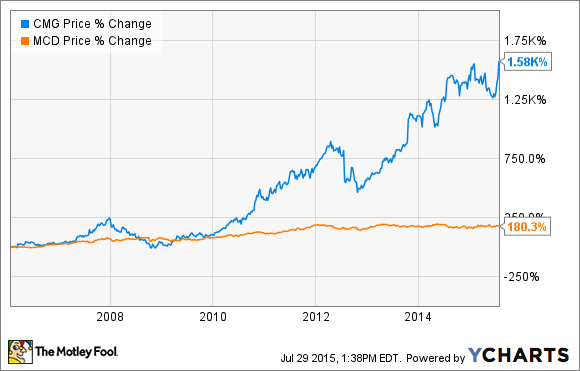Sophisticated investors vigilantly monitor the changing competitive dynamics of the industries in which they invest. That's because companies with deteriorating business models can deliver sizable losses to their investors, while those with strengthening competitive advantages can generate handsome profits. In that regard, we asked some top Motley Fool contributors to name the stock swaps they would make in three dynamic industries -- restaurants, online travel, and energy. This is what they had to say.
Joe Tenebruso: The global shift toward healthier eating is having a tremendous impact on the restaurant industry. Yesterday's winners are quickly becoming today's losers, and fresher, more innovative concepts are taking share from the old guard.
For example, McDonald's (MCD -0.05%), long an icon of the restaurant industry, is struggling with declining same-store sales and a stagnating stock price as diners seek out healthier fare. With a reputation built upon quick, convenient, and inexpensive fast-food, McDonald's now finds itself in a precarious situation. If the burger behemoth declines to upgrade its menu, customers will likely continue to abandon it for competitors offering higher-quality food options. Yet if McDonald's does decide to offer better ingredients, it will have to choose between absorbing higher food costs -- which would dent its profit margins -- or increasing menu prices, which could exacerbate its sales problems by alienating its core base of price-sensitive customers.
Ironically, Chipotle, which was once a subsidiary of McDonald's until it was spun off from the burger giant in 2006, is one of the primary beneficiaries of these evolving consumer eating habits. While a sodium-packed 1,000 calorie burrito may not be the healthiest of food options, the Mexican food chain's focus on high-quality ingredients and responsible sourcing methods has helped drive staggering same-store sales growth and a more than 10-fold increase in stock price over the last decade.
With the healthier eating megatrend showing no signs of abating, I expect McDonald's growth to remain challenged in the years ahead. Chipotle, on the other hand, has a growth runway that could last well beyond the next decade. As such, investors may wish to consider passing on the burgers in favor of the burritos.
Dan Caplinger: The online travel industry is more competitive than ever, and different players have had varying degrees of success with their strategies at attacking the space. After TripAdvisor's (TRIP 0.11%) recent weakness, I think Priceline (BKNG -0.47%) will continue to outperform its competitors.
In TripAdvisor's most recent quarterly results, the company posted substantial growth, but trends in key areas like the international segment moderated somewhat. Moreover, TripAdvisor saw margins in its key hotel segment plunge by seven percentage points to 36% during the quarter as the company made big investments in an effort to expand its reach and stand up to rising competition.
By contrast, Priceline has consistently found ways to widen its network across the globe, with a substantial international presence that has given the company a huge competitive advantage over its peers. By integrating hotel-room booking, rental car reservation, and restaurant reservation capabilities into a single platform effectively, Priceline hopes to prove that its recent acquisitions will pay off in the long run.
Both TripAdvisor and Priceline have to navigate the same conditions in the travel industry. Yet over time, Priceline has proven itself to be more forward-thinking than some of its rivals, and that should produce better results for long-term investors over time.
Jason Hall: The oil market has been roiling for a year now, and this has wreaked havoc on just about every sector of the industry. This has especially hurt offshore drilling operators like Seadrill, Ltd. (SDRL), which has seen the value of its shares fall 80%. Furthermore, the company's outlook -- along with that of the rest of the offshore drilling industry -- remains uncertain and weak as global oil prices remain depressed on weak demand, keeping oil producers from investing in high-cost offshore oilfields.
Seadrill is especially exposed right now. The company's operating expenses and debt are only going to increase over the next year as $3 billion-plus in new vessel obligations come due. Considering that 2016 may be even weaker than this year, there will be big pressure to land contracts for the roughly dozen newbuilds coming. In short, Seadrill could be entering dire straits.
However, American midstream operator ONEOK (OKE 0.75%) is in a different situation, with demand for its pipeline and gathering services -- held within ONEOK Partners, the MLP that ONEOK controls -- actually growing as demand for natural gas increases.
Furthermore, while the company's exposure to NGL prices is weighing on the bottom line and could be bad for ONEOK Partners unitholders, ONEOK's share of the income is more than sufficient to support the dividend at current levels while management takes steps to reduce exposure to commodity prices.
Yes, both ONEOK and Seadrill face some uncertainty, but ONEOK's is a blip on the radar in the midst of growing demand, while Seadrill may be in for the fight of its life in a very weak and uncertain demand environment.






